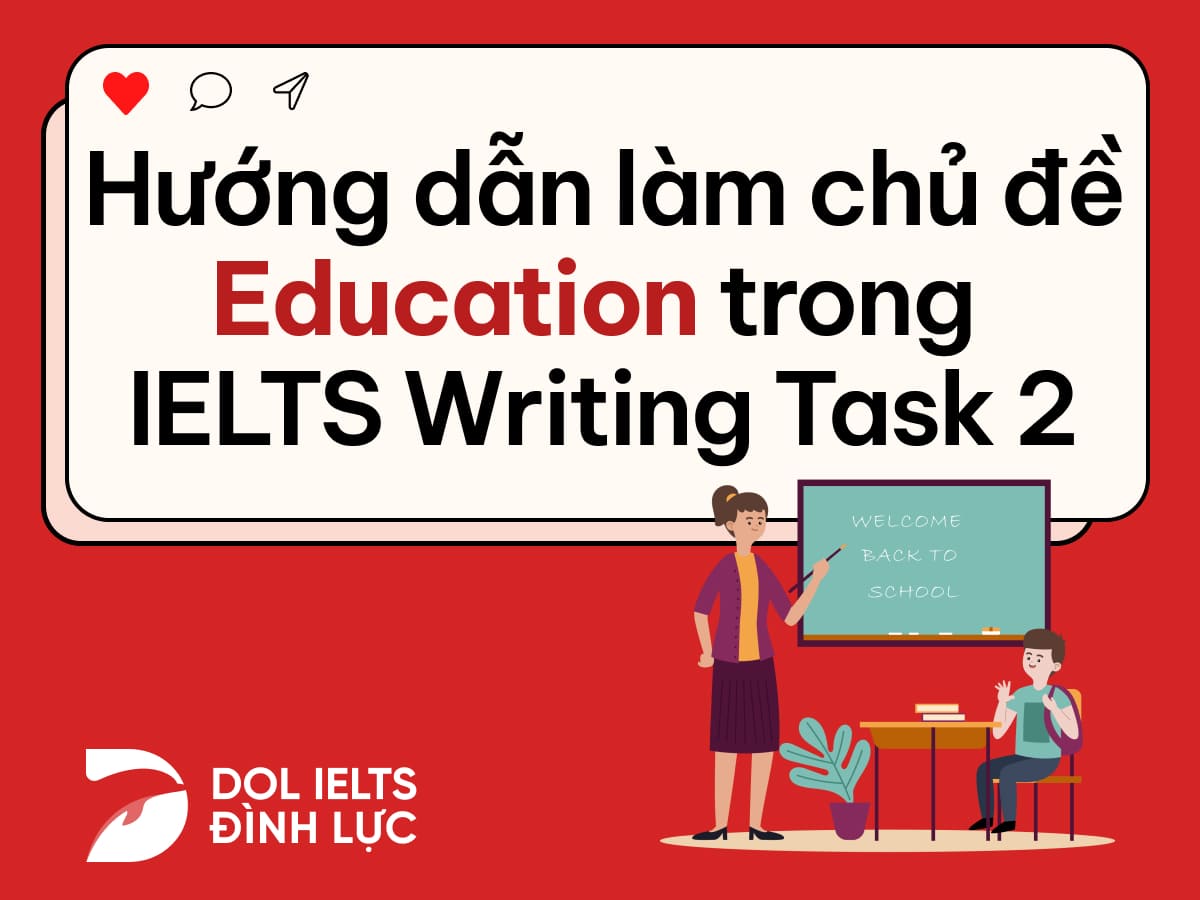Hướng dẫn làm chủ đề Education trong IELTS Writing Task 2
Education (Giáo dục) là một trong những chủ đề phổ biến nhất trong IELTS Writing Task 2. Chủ đề này được đánh là có độ khó ở mức trung bình. Để làm tốt bài viết về chủ đề Education, bạn cần phải có kiến thức tổng quan về giáo dục và các vấn đề tranh luận phổ biến trong chùm chủ đề này.
Trong bài viết này, DOL sẽ cung cấp cho bạn thông tin chi tiết về IELTS Writing Task 2 topic Education, bao gồm: cách thức xây dựng cấu trúc bài viết, ý tưởng cho từng phần cụ thể, từ vựng quan trọng để ghi điểm và bài mẫu để luyện tập.
Cùng DOL tìm hiểu bài viết dưới đây để phát triển ý tưởng cho bài viết IELTS của mình nhé!
DOL IELTS Đình Lực
Nov 08, 2021
2 mins read

Table of content
Các đề bài Education trong IELTS Writing Task 2
Ý tưởng triển khai chủ đề Education
Giving children homework everyday
Teaching history subjects
Focusing on Science subjects
Making art & music compulsory
The influence of technology on education
Wearing uniforms
Funding in education
Parents put pressure on students
Từ vựng và Collocation chủ đề Education
Từ vựng IELTS Writing chủ đề Education
Collocation chủ đề Education
Bài mẫu topic Education IELTS Writing Task 2
Các câu hỏi thường gặp
Các đề bài Education trong IELTS Writing Task 2
Giáo dục là một trong những IELTS Writing Task 2 topics thường gặp và tưởng chừng dễ dàng vì không đòi hỏi nhiều kiến thức sâu rộng. Tuy nhiên, để đạt điểm cao, bạn cần phải đưa ra các ý tưởng sáng tạo và phân tích chặt chẽ, ngay cả trong những đề bài tưởng chừng như đơn giản.
Đề bài Education Task 2 có thể đề cập đến các vấn đề như sau.
Cấu trúc môn học
Chi phí giáo dục
Cơ hội du học
Các phương pháp giáo dục hiện đại
Vấn đề và hướng giải quyết cho sự phát triển giáo dục
Ảnh hưởng của thầy cô và ba mẹ đến trẻ
Quan điểm về việc học cao học (thạc sĩ, tiến sĩ)
Ảnh hưởng của giáo dục giới tính/chế độ giáo dục dạy chung cho nam và nữ
Dưới đây là một số đề bài liên quan đến chủ đề Education Essay IELTS bạn có thể tham khảo.
University education should be free to everyone, regardless of income. To what extent do you agree or disagree? (Giáo dục đại học nên được miễn phí cho tất cả mọi người, bất kể thu nhập. Bạn đồng ý hay không đồng ý với quan điểm này?)
In some countries, young people are encouraged to study abroad What are the advantages and disadvantages of this trend? (Ở một số quốc gia, thanh niên được khuyến khích đi du học nước ngoài. Xu hướng này có những ưu và nhược điểm gì?)
Some high schools require all students to wear school uniforms. Other high schools permit students to decide what to wear to school. Which of these two school policies do you think is better? (Một số trường trung học yêu cầu tất cả học sinh mặc đồng phục. Một số trường trung học khác cho phép học sinh tự quyết định trang phục đến trường. Bạn cho rằng chính sách trường học nào trong hai điều này tốt hơn?)
Government should invest in teaching science subjects rather than other subjects for the country to develop and progress. To what extent do you agree or not agree? (Chính phủ nên đầu tư vào việc dạy các môn khoa học thay vì các môn học khác để đất nước phát triển và tiến bộ. Bạn đồng ý hay không đồng ý với quan điểm này?)
Some people think that it is more effective for students to study in a group, while others believe that it is better for them to study alone. Discuss both views and give your own opinion. (Một số người cho rằng học nhóm hiệu quả hơn học cá nhân. Những người khác lại tin rằng học một mình tốt hơn. Thảo luận cả hai quan điểm và đưa ra ý kiến của riêng bạn.)
The best way to teach children to cooperate is through team sports at school. To what extent do you agree or disagree?
The government should spend money in promoting sport and art in school, rather than sponsoring professional sports and art events in communities. To what extent do you agree or disagree?
Students in school or university learn more from classes of teachers than other resources (eg Internet or TV). To what extent do you agree or disagree?
Some people say that playing computer games is bad for children in every aspect. Others say that playing computer games can have positive effects on the way children develop. Discuss both views and give your opinion.
In some countries, secondary schools aim to provide a general education across a range of subjects. In others, children focus on a narrow range of subjects related to a particular career. Which do you think is appropriate in today's world?
Các chủ đề bài luận IELTS thường được đưa ra nhằm kiểm tra khả năng suy nghĩ, kiến thức, kỹ năng của thí sinh. IELTS Writing task 2 thường bao gồm các chủ đề về vai trò của giáo dục, giáo dục đại học, môi trường, khoa học & công nghệ thông tin và bình đẳng giới.
https://leapscholar.com/blog/ielts-essay-on-education/
Ý tưởng triển khai chủ đề Education
DOL cung cấp cho bạn một số ý tưởng cho subtopic hay gặp trong bài chùm chủ đề Education, gồm.
Homework for children: Bài tập về nhà cho học sinh
Teaching relevant subjects to children (Science subjects, history, art…): Giảng dạy các môn học liên quan (Các môn Khoa học, Lịch sử, Nghệ thuật…)
The influence of technology on education: Ảnh hưởng của công nghệ đối với giáo dục
Studying abroad: Du học
Wearing uniforms: Mặc đồng phục
Funding in education: Tài trợ trong giáo dục
Parents put pressure on students: Cha mẹ gây áp lực lên học sinh
Những idea phát triển cho từng subtopic của chủ đề Education có thể được sắp xếp theo mental model Advantages và Disadvantages như sau.
Giving children homework everyday
Khi phát triển ý tưởng cho subtopic “Giving children homework everyday” dưới góc độ lợi ích và bất lợi, bạn có thể xem xét như sau.
 Advantages/For
Advantages/ForBe forced to work independently away from the environment of schools → proactively apply the knowledge that they have learnt in the classroom → think individually and creatively in correspondence to a particular task → develop an independent study habit → prepare them to work alone as adults.
Have home assignments completed multiple times on a daily basis → serve as an additional practice and revision of the lesson taught to them in the school → retain information more easily → reduce the exam stress considerably.
 Disadvantages/Against
Disadvantages/AgainstHave an obligation to complete the homework while having to deal with an excessive load of knowledge at their school + constant examinations → sacrifice their sleep to meet academic demands → exhaust the child + reduce their interest in school studies → suffer from depression.
Return home with excessive amounts of homework → reduce children’s after-school time for other extracurricular and leisure activities → unable to develop necessary soft-skills
Teaching history subjects
Bạn có thể phát triển ý tưởng cho subtopic “Teaching history subjects” dưới góc độ lợi ích và bất lợi như sau.
 Advantages/For
Advantages/ForHave thorough insights into what happened in the past in one’s own country => understand their hometown’s traditional values and develop a national identity => take pride in their origins and treasure the life they know as it is today.
Accumulate knowledge of this particular field at an early age => enhance their understanding about various aspects of the world => to work for foreign enterprises, especially those who highly value company culture.
 Disadvantages/Against
Disadvantages/AgainstLearn history => be imposed to memorize dates and events from the past => rarely use them in people’s lives => be of little relevance to future and today’s society.
(historical events) be seen in different perspectives and interpreted in different ways => (students) normally learn the subject through only one source => discount its importance as a subject for learning.
Focusing on Science subjects
Tham khảo cách phát triển ý tưởng cho subtopic “Focusing on Science subjects” dưới góc độ lợi ích và bất lợi sau.
 Advantages/For
Advantages/ForForce people to choose scientific subjects like biology, mathematics, physics and chemistry => ensure that any knowledge and skill gaps in the economy are covered => increase the overall GDP of the nation => improve a country’s future prosperity.
Attain science degrees => be provided with foundational knowledge to adapt to the fast-moving technological development => increase their future employment prospects.
 Disadvantages/Against
Disadvantages/Against(A major in science) consists of related subjects with a great amount of specialized knowledge and tough experiments => require a lot of diligence + patience + intelligence => put students under great pressure in order to understand and handle the tasks well.
(some countries) have fewer employment opportunities available in science fields => have little chance to get a job after graduation despite spending a huge amount of time and effort on this particular subject => increase the employment rate.
Making art & music compulsory
Để phát triển ý tưởng về subtopic “Making art & music compulsory”, bạn có thể triển khai như sau.
Learn art-related subjects from institutions => enjoy learning through enjoyable and creative methods => enhances fine motor skills, hand-eye coordination and problem-solving skills => assists children in attaining better learning outcomes.
Be more interested in non-academic subjects => get hands on experience in these subjects at an early age => give students a platform where they can develop and perfect their artistic skills => become easier for them to pursue their creative career in future.
Be already burdened with a regular academic curriculum => (perform art) enhance that study load => decrease their academic results.
Be of the mindset that art has no participation in the advancement of human society => be generally considered as a hobby rather than a professional field => opt for other vocational subjects such as science or commerce stream, which have jobs available in abundance.
The influence of technology on education
DOL chia sẻ cho bạn hướng dẫn cách phát triển ý tưởng cho subtopic “The influence of technology on education”.
Incorporate technology in teaching => Example: use visual aids, presentations, video clips… => engage students in the lesson => improve the teaching and learning quality
enable the use of online classes => provide a good education for students from rural areas => improve their career prospects
the development of technological devices (ex: cellphones, ipads, television…) => easily distract students from their study => affect study performance
Studying abroad
Bạn có thể mở rộng ý tưởng cho “Studying abroad” theo cách dưới đây.
Experience a completely different way of living. Ex: try exotic foods and learn about traditions unique to the host culture => more knowledgeable, open-minded and tolerant => become a global citizen of the 21st century
Grant students the opportunity to completely immerse oneself in a new language => receive considerable language practice => see significant improvements in language proficiency
Might struggle to integrate into local opportunities + Lack the emotional support of family => Suffer from social isolation, loneliness, and homesickness => More likely to develop mental health issues such as depression and anxiety
Have to factor in flights, accommodation, travel expenses, and living costs => Otherwise: the price of a year abroad can escalate without you realising. => exacerbate financial stress
Wearing uniforms
Để trả lời cho subtopic “Wearing uniforms”, bạn có thể phát triển như sau.
Wear the same clothes everyday => students do not need to spend time thinking about what to wear => save time on other more useful activities
All students wear the same clothes => bridge the gap between the rich and the poor # have freedom to wear any clothes they want => rich students may show off => widen social gaps
Wear the same clothes => deter students from showcasing their unique personalities => a lack of self-expression Wear the same clothes everyday => boring => demotivate students
Funding in education
Đối với subtopic “Funding in education”, bạn có thể khai thác ý theo cách dưới đây.
government pays for children's education => receive equal education opportunities => attract low-income students => enable unprivileged children to obtain higher paying jobs after graduation => can make greater contributions to the national economy => poverty would evaporate quickly
provide complete financial support for students' education => minimize the amount of time spent on unproductive and harmful activities => prevent the development of social issues among children
provide financial support for a booming student population => the money being spent on each individual drops to a historic low => standards of education are compromised => fail to produce outstanding graduates => struggle to bring about truly revolutionary innovations for society
make education free for children => the government has to cover a variety of expenses. Example: salaries for professors, textbooks for students, modern classroom equipment => drain the state budget => resources for other sectors are depleted
Parents put pressure on students
Áp lực từ phía cha mẹ đối với học sinh là một vấn đề đáng quan tâm trong hệ thống giáo dục hiện đại. Cùng DOL tìm hiểu cách phát triển sau nhé!
Teach students about hard work + encourage them to try harder in life => develop good personality traits in later life (perseverance)
Good academic results => higher chance of getting into good universities => improve future career projects
Encourage their children to acquire an occupation that they do not have passion for => (children) not express their own ideas and desires => not feel the real sense of job satisfaction => have an undesirable life.
Engage their children only for future achievements + omit the entertainment part of the youngsters => (children) be exposed to great stress => affect their mental wellbeing and cause psychological suffering.
Lưu ý: Những câu hỏi về chủ đề này thường liên hệ đến cuộc sống và mang tính chất cảm tính, nên bạn cần đưa ra những ý kiến thường thấy và sau đó là ý kiến của bản thân bạn. Chọn một lý do hợp lý để biện giải cho những ý kiến đó, vì sao bạn cho là đúng và vì sao bạn cảm thấy nó quan trọng. Nhắm trọng tâm vào việc sử dụng kết cấu câu và từ ngữ uyển chuyển, văn phong gọn gàng nhưng diễn tả đầy đủ ý của bạn cũng như việc phân tích vấn đề được đưa ra.
🔎 Bạn có thể xem thêm chủ đề khác.
Từ vựng và Collocation chủ đề Education
Việc sử dụng được các từ vựng và collocation phong phú sẽ giúp bạn diễn đạt ý tưởng một cách trôi chảy và tự nhiên trong bài thi.
Từ vựng IELTS Writing chủ đề Education
Bảng dưới đây cung cấp một số từ vựng phổ biến ăn điểm trong chủ đề Education.
Từ vựng | Dịch nghĩa |
Analyze (v) | phân tích |
Compulsory (adj) | bắt buộc |
Curriculum (n) | chương trình học |
Degree (n) | bằng cấp |
Discipline (n) | hệ thống luật lệ |
Evaluate (v) | đánh giá một cách thận trọng |
Graduate (v) | tốt nghiệp |
Inquisitive (adj) | ham hiểu biết |
Procrastinate (v) | trì hoãn, chần chừ |
Qualification (n) | khả năng chuyên môn, trình độ chuyên môn |
Theory (n) | lý thuyết |
Collocation chủ đề Education
Bảng dưới đây cung cấp một số collocation phổ biến ăn điểm trong chủ đề Education.
Collocation | Dịch nghĩa |
To conduct a research | Thực hiện một nghiên cứu |
Give out homework | giao bài tập về nhà |
Deliver a speech/lecture = Make a presentation | thuyết trình |
Lack of discipline | vô kỷ luật |
Fall behind with studies | không theo kịp việc học ở trường |
To have better job opportunities | có cơ hội việc làm tốt hơn |
Have unusual intelligence | cực kỳ thông minh |
To be well-acquainted with | làm quen với, quen thuộc với |
Win a scholarship | dành được học bổng |
School entrance age | tuổi đi học |
Bài mẫu topic Education IELTS Writing Task 2
Cùng quan sát thử một bài viết mẫu thuộc chủ đề Education, áp dụng các ideas và vocab trong bảng tổng hợp phía trên nhé!
Topic 1: University education should be free to everyone, regardless of income. To what extent do you agree or disagree?
Sample essay.
Some people believe that the government should provide a free university education to all students regardless of how much money they make. From my perspective, while I acknowledge the benefits of doing this, I still believe it is unreasonable for the government to offer an education at no cost.
On the one hand, it is true that there are several benefits that students can reap from receiving a free education. In fact, when the government pays for students' education, it means that all students have equal education opportunities. This can attract low-income students and enable unprivileged students to obtain higher paying jobs after graduation. As a result, it can make greater contributions to the national economy, and therefore poverty would evaporate quickly. In addition, allowing poor students to spend time studying also minimizes the amount of time spent on unproductive and harmful activities. Thus, it can prevent the development of social issues among children
However, I still argue that it is not feasible to provide a free education for everyone. As for the first drawback, since the government has to provide financial support for a booming student population, the money being spent on each individual drops to a historic low. This results in compromised standards of education and the education ultimately fails to produce outstanding graduates. Moreover, making education free for children means that the government has to cover a variety of expenses, such as salaries for professors, textbooks for students, modern classroom equipment… This may drain the state budget and deplete the resources for other sectors.
In conclusion, while I agree that providing a free university education for everyone can be beneficial in some aspects, I still believe that doing this can affect the society in negative ways and thus should not be encouraged.
Topic 2: Some people believe the aim of university education is to help graduates get better jobs. Others believe there are much wider benefits of university education for both individuals and society. Discuss both views and give your opinion.
Essay plan.
Mở bài
Giới thiệu ngắn gọn về để dẫn vào hai ý kiến trong đề. Bạn có thể thay đổi lại ý chính trong đề sao cho nghĩa không đổi.
Đoạn thân bài 1
Trong đoạn đầu tiên của phần thân bài, chúng ta sẽ đưa ra lý do củng cố luận điểm: The aim of university education is to help graduates get better jobs (Mục đích của trường Đại học là giúp sinh viên tốt nghiệp có việc làm tốt hơn).
Many people attend university to appear more attractive towards employers: Nhiều người học đại học để dễ được các nhà tuyển dụng chú ý hơn.
High education is expensive => it wouldn’t be reasonable to attend it without expecting future financial secure: Đại học đắt tiền => Nếu chỉ học mà không kỳ vọng sẽ kiếm được tiền
Đoạn thân bài 2
Trong đoạn này, ta nêu ra các lý do bảo vệ ý: There are much wider benefits of university education for both individuals and society (Học đại học có nhiều lợi ích hơn chỉ để kiếm việc làm)
Studying in university helps the students develop better social skills and improve as a person: Học Đại học giúp sinh viên phát triển được kỹ năng xã hội hơn.
Society is going to benefit from graduates with high knowledge: Xã hội sẽ phát triển khi có nhiều người với học thức cao.
Kết bài:
Tóm tắt lại các lý do ở trên và khẳng định điều mình đã khẳng định ở mở bài.
Sample essay.
These days, more and more people are making the choice to go to university. While some people are of the opinion that the only purpose of university education is to improve job prospects, others think that society and the individual benefit in much broader ways.
It is certainly true that one of the main aims of university is to secure a better job. The majority of people want to improve their future career prospects and attending university is one of the best ways to do this as it increases a person's marketable skills and attractiveness to potential employers. In addition, further education is very expensive for many people, so most would not consider it if it would not provide them with a more secure future and a higher standard of living. Thus job prospects are very important.
However, there are other benefits for individuals and society. Firstly, the independence of living away from home is a benefit because it helps the students develop better social skills and improve as a person. A case in point is that many students will have to leave their families, live in halls of residence, and meet new friends. As a result, their maturity and confidence will grow to enable them to live more fulfilling lives. Secondly, society will gain from the contribution that graduates can make to the economy. We are living in a very competitive world, so countries need educated people in order to compete and prosper.
Therefore, I believe that although the main aim of university education is to get the best job, there are clearly further benefits. If we continue to promote and encourage university attendance, it will lead to a better future for individuals and society.
Topic 3: Everyone should stay in school until the age of eighteen. To what extent do you agree or disagree?
Essay plan.
Mở bài: Giới thiệu ngắn gọn về để dẫn vào hai ý kiến trong đề. Bạn có thể thay đổi lại ý chính trong đề sao cho nghĩa không đổi. Ở bài mẫu này, ta sẽ triển khai bài theo ý disagree.
Luận điểm 1: People leaving school too early might be unskilled at work: Những người rời trường học quá sớm sẽ thiếu nhiều kỹ năng ở công việc.
Luận điểm 2: School provides moral and social education: Trường học cung cấp nhiều sự hướng dẫn về các vấn đề đạo đức và văn hóa.
Kết bài: Tóm tắt lại các lý do ở trên và khẳng định điều mình đã khẳng định ở mở bài.
Sample essay.
It is often said that if you want to succeed in life, you need a proper education. While there may be arguments for making school compulsory until the age of 18, I disagree that this should apply to everyone.
Perhaps the strongest reason for not leaving school early is that it prepares you for your working career. If you leave school early with only a basic education, you are unlikely to be able to find any skilled work. Indeed, the education you receive between the ages of 16 and 18 is crucial for anyone who does not want a lifetime of unskilled work in a factory.
Another compelling reason for remaining in school until 18 is that school provides moral and social education too. This is particularly important for people between 16 and 18 who have many temptations and benefit from the organized framework that school provides. Young people who stay in school until the age of 18 tend to be more responsible and help build a stronger society.
There are, however, equally strong arguments against making school compulsory until the age of 18. One such argument is that not everyone is academic and that some people benefit more from vocational training. For instance, someone who wants to become a car mechanic may find better training and more satisfaction in an apprentice scheme. Another related argument is that, in today’s world, young people are maturing ever more quickly and are able to make their own life decisions by the age of 16.
In my mind, everyone should be encouraged to stay in school until 18 both for social and career reasons. However, I believe it would be a mistake to make this compulsory bearing in mind that different people have different needs and abilities and the possibilities of other forms of vocational training.
Trên đây là hướng dẫn cụ thể của DOL để các bạn viết bài IELTS Writing Task 2 chủ đề Education một cách hiệu quả nhất. Các từ vựng, cấu trúc câu và gợi ý bài mẫu liên quan đến chủ đề Giáo Dục nguồn tài liệu cực kỳ hữu ích giúp bạn trong quá trình luyện tập chuẩn bị cho kỳ thi IELTS. Tuy nhiên, có bao nhiêu nguồn tham khảo đi chăng nữa thì bạn nên chịu bỏ ra thời gian và công sức rất nhiều để đạt được band điểm IELTS như mong đợi nhé.
 Ngoài ra, còn có một số chủ đề IELTS Writing Task 2 khác thường xuất hiện.
Ngoài ra, còn có một số chủ đề IELTS Writing Task 2 khác thường xuất hiện.
Các câu hỏi thường gặp
Why education is important in our life?
Có thể trả lời như sau: Education helps a person to get knowledge and improve confidence in life. It can help you improve your career and your personal growth. An educated person can become a great citizen in society. It helps you to take the right decisions in life.
What is the importance of education essay?
Gợi ý trả lời: Education certainly determines the quality of an individual's life. Education improves one's knowledge, skills and develops the personality and attitude. Most noteworthy, Education affects the chances of employment for people. A highly educated individual is probably very likely to get a good job.
What are the 7 roles of a teacher?
Bạn có thể trả lời như sau. The primary roles of a teacher are:
Providing mentorship
Inspiring learners
Nurturing healthy curiosity in learners
Creating meaningful learning experiences
Leveraging technology to support learning
Mediating and liaising
Researching learning strategies
Table of content
Các đề bài Education trong IELTS Writing Task 2
Ý tưởng triển khai chủ đề Education
Giving children homework everyday
Teaching history subjects
Focusing on Science subjects
Making art & music compulsory
The influence of technology on education
Wearing uniforms
Funding in education
Parents put pressure on students
Từ vựng và Collocation chủ đề Education
Từ vựng IELTS Writing chủ đề Education
Collocation chủ đề Education
Bài mẫu topic Education IELTS Writing Task 2
Các câu hỏi thường gặp
